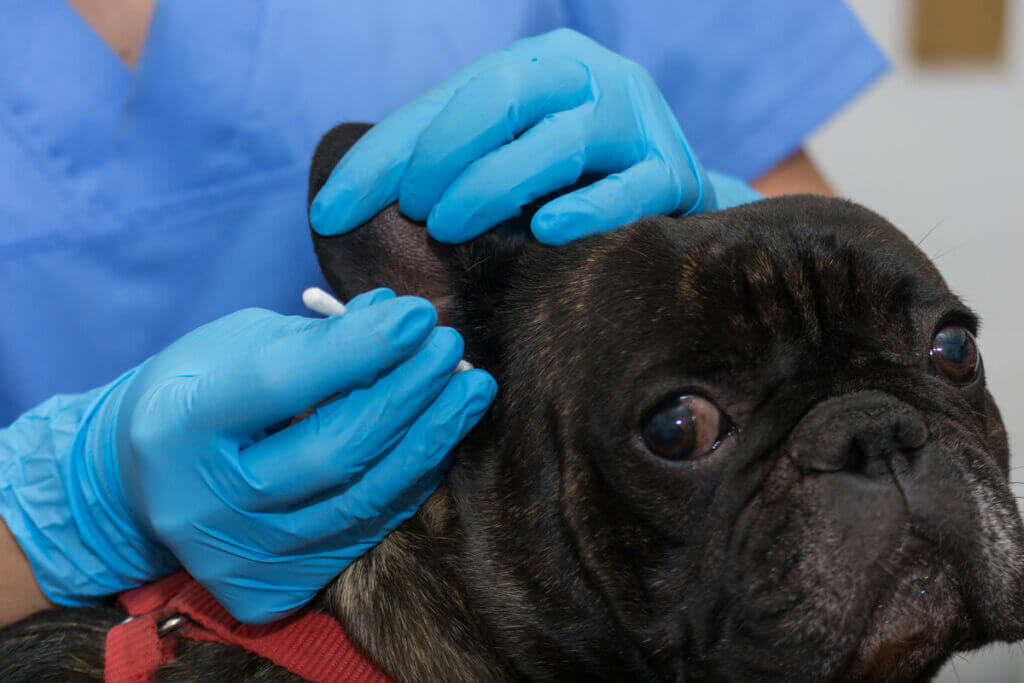What Are the Causes of Otitis Externa in Dogs?

Otitis externa in dogs is a fairly common problem, especially in certain breeds with large and floppy ears which, due to their morphology, have little ventilation in that region.
This condition can cause a lot of itching and discomfort to the animal. As keepers of dogs, it’s important to maintain a regular cleaning of your dog’s ears, as well as going to the vet in case of an infectious outbreak. Today, we’ll explain all the possible causes of canine otitis.
Symptoms of otitis externa
The symptoms of otitis externa in dogs are quite evident, so you’ll have no problem identifying them. Below, we’ll list the most common clinical signs of this illness:
- Dark discharge from the ear canal: the ears are stained with a sticky substance, sometimes brown and smelly.
- Signs of pain: otitis externa can cause considerable discomfort to the animal, and they can be seen to tilt its head to one side, which coincides with the affected ear. The pet can also change its behavior and become irritated or even aggressive.
- Head shakes: with these shakes, dogs can splash some of the dirt off their ears.
- Moderate or severe itching: the dog continuously scratches its ear.
- Inflamed ear canal: this will be detected by the vet at the clinic with the help of an otoscope.
In view of these signs, it’s important to go to the vet to perform an examination and detect the cause and type of otitis that the animal is suffering from. A quick detection will always facilitate the dog’s treatment and recovery.

What causes otitis externa in dogs?
Otitis externa can have very different causes, so the treatment can vary according to the triggering agent. For this reason, it’s very important to go to the veterinary clinic in order to receive a suitable diagnosis. Next, we’ll show you the most common causes of canine otitis.
Infectious causes
There are many infectious agents that can affect a dog’s ear. Among them, we find the following:
- Mites: The proliferation of some mites can cause otitis externa in dogs. The main species that attack dogs’ ears are Otodectes cynotis, Demodex and Sarcoptes scabiei. These invertebrates produce a dark brown and odorous secretion.
- Yeast and fungal infections: Malassezia naturally inhabits the animal’s skin, but its uncontrolled growth can cause ear infections.
- Bacterial infections: Bacteria of the genus Staphylococcus or Pseudomonas cause otitis in dogs, and also produce a bad smell.
Presence of a foreign body in the ear canal
It’s very common for the cause of otitis externa to be some sort of spike that entered the duct during a walk, in which case it’ll have to be removed. Don’t try to do it at home because you could insert the spike deeper into the ear. The vet will extract it using the appropriate technique and instruments.
Breed predisposition
Otitis externa is the inflammation of the mucous membrane of the external auditory canal, and is frequent in dogs with droopy and heavy ears, because poor ventilation of the canal favors the proliferation of bacteria and yeast. It can also be common in dogs with small ear canals or with abundant hair in the ears, such as the Yorkshire Terrier.
Other causes
Apart from the previously described reasons, there are also other causal agents that can cause otitis in dogs. We’ll name some of them briefly:
- Allergy: Otitis externa is usually related to allergy cases. In this case, it can be accompanied by itching, redness, scabs and secretions.
- Humidity in the auditory canal: Humidity and temperature are key factors in the growth of microorganisms. Large ears retain more moisture because they’re more difficult to dry.
- Pathologies of diverse nature: Endocrine diseases, reactions to toxic products or hypertrophy of the auditory tissue.
Treatments for otitis externa in dogs
In case of an otitis externa, the vet at the clinic will clean the animal’s ear and may take a sample of the discharge, which will be examined under a microscope to determine the agent causing the otitis.
Depending on the cause of the pathology, ear cleaners can be applied with antibiotics, acaricides or antifungals depending on whether the causal agent is bacteria, mites or fungi. The vet may also prescribe an anti-inflammatory to the dog to reduce inflammation or an analgesic to relieve its pain.
Many of these medicines are available only with a veterinary prescription, so you’ll have to buy them at the clinic or at the pharmacy with the prescription signed by the vet.
Otitis can have complications, and some dogs live with chronic otitis all their lives and need more frequent cleaning and check-ups at the vet. Sometimes, excessive scratching and shaking of the head can cause internal bleeding of the ear, called otohematoma, which requires surgical intervention.

Prevention of otitis externa in dogs
As a preventive measure, the pet’s keeper should perform a periodic cleaning of the ear to avoid relapses. Obviously, as in many other cases, good hygiene is the best treatment.
There are ear cleaners especially designed for dogs, so the ones for humans can’t be used for dogs. In addition, avoid using swabs, and use instead clean gauze to remove the bits drawn out by the ear cleaner.
All cited sources were thoroughly reviewed by our team to ensure their quality, reliability, currency, and validity. The bibliography of this article was considered reliable and of academic or scientific accuracy.
- Fidalgo, L. E., Rejas, J., Ruiz de Dopegui, R., Ramos, J. J.Patología Médica Veterinaria. Salamanca, Kadmos, 2003.
- Affinity petcare. Especial otitis en perros: todo lo que debes saber.